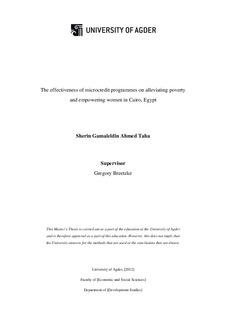| dc.contributor.author | Taha, Sherin Gamaleldin Ahmed | |
| dc.date.accessioned | 2013-03-01T09:21:20Z | |
| dc.date.available | 2013-03-01T09:21:20Z | |
| dc.date.issued | 2012 | |
| dc.identifier.uri | http://hdl.handle.net/11250/135257 | |
| dc.description | Master thesis in development management- University of Agder 2012 | no_NO |
| dc.description.abstract | The ability of microfinance and microcredit programmes to alleviate poverty and fuel development is often debated and questioned. This study aims to contribute to this literature by investigating the impact of microcredit programmes on alleviating poverty and empowering women in Cairo, Egypt. I also investigate the efficiency of management policies of microcredit institutions in targeting the ‘real’ poor. Lastly provide some insights on how to enhance these programmes effectiveness in alleviating poverty. Using a quasi experimental research design, this study supports the extant literature that found a positive impact of microcredit programmes on enhancing the participants’ income, expenditure, quality and quantity of food and children’s education. In addition the results reveal a significant positive correlation between microcredit and an increase in recipients’ business profits and capital. However I did not find that the provision of microcredit was able to enhance women’s feelings of empowerment and independence. Moreover the targeting criteria of microcredit institutions were found to be not that efficient in being able to reach the extreme poor. In addition I could not find results that verify the efficiency of women in managing microcredit compared to men. This finding questioned the validity of microfinance institutions policy (that usually target poor women rather than poor men) in the Egyptian society where men are considered the main household bread winners.
Finally the study referred to common challenges in microfinance business that apparently microfinance institutions in Cairo are facing. The focus of these institutions on making a profit often hinders these programmes in terms of their poverty alleviation strategies. In general for these programmes to be more effective in alleviating poverty a new paradigm or regulatory body is required to link microcredit institutions with each other, organize collective efforts, and make it more attached to the real developmental needs of the poor. | no_NO |
| dc.language.iso | eng | no_NO |
| dc.publisher | Universitetet i Agder; University of Agder | no_NO |
| dc.subject.classification | UT 503 | |
| dc.title | The effectiveness of microcredit programmes on alleviating poverty and empowering women in Cairo, Egypt | no_NO |
| dc.type | Master thesis | no_NO |
| dc.subject.nsi | VDP::Social science: 200::Economics: 210::Economics: 212 | no_NO |
| dc.source.pagenumber | 82 s. | no_NO |
